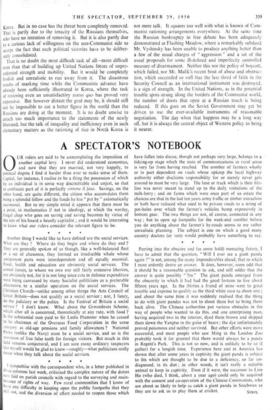Another thing I would like to have defined are the
social services. What are they ? Where do they begin and where do they end ? They are generally spoken of as though, like a -well-balanced fleet or a set of chessmen, they formed an irreducible whole whose component parts were interdependent and all equally essential. Food, health and education are obviously social services. The armed forces, to whom we owe our still fairly extensive liberties, are obviously not, for it is not long since cuts in defence expenditure were being canvassed by many Socialist politicians as a preferable alternative, to a similar operation on the social services. The Christian Church—unlike among other things the Arts Council of Great Britain—does not qualify as a social service ; nor, I fancy, do the judiciary or the police. Is the Festival of Britain a social service ? I don't know. What about the Groundnuts Scheme, which after all is concerned, theoretically at any rate, with food ? Is the substantial sum paid to Sir Leslie Plummer when he ceased to be chairman of the Overseas Food Corporation in the same category as old-age pensions and family allowances ? National Parks (unlike the Navy) must be a social service, and so is the provision of free false teeth for foreign visitors. But much in this field remains conjectural, and I am sure many ordinary taxpayers like myself would be glad to know—roughly—what politicians really mean when they talk about the social services.
* * * *


























 Previous page
Previous page